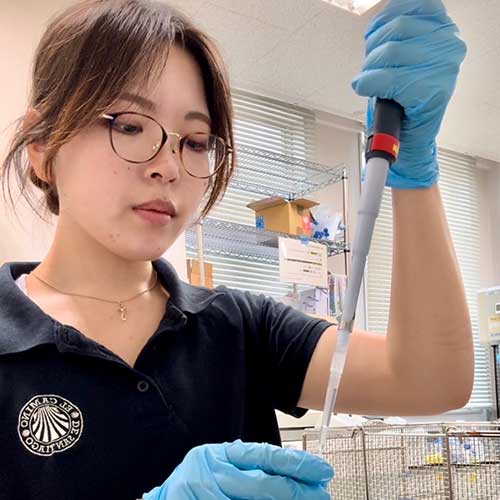
Neuroscience major explores neurological research and career options during APEX fellowship.

Mako Shimizu ’26 a neuroscience major and chemistry minor at The College of Wooster, completed an APEX fellowship at Imai Lab at Kyusyu University in Fukuoka, Japan. At the lab, she studied the vagus nerve between the gut and brain and tried to reveal how different chemicals are detected and conducted to the brain. During her internship Shimizu developed multitasking skills and learned about the diversity of topics in neurobiology research. Her APEX fellowship allowed her to learn from the experiences of scientists from around the world and explore her future career options.
“This internship has increased my interest in the field of neurobiology. I thought neurobiologists focus on only the brain, but I realized their research topics are wide-ranging. Some people are exploring the connections of multiple neurons, the gut, the olfactory system, and the neuron pruning system during adolescence. Learning these topics not only thrilled me, but also broadened my perspectives on neuroscience.”
— Mako Shimizu ’26
Q: Why was the position a good fit for you?
Shimizu: One reason I came to a liberal arts college in the United States was to learn new things across multiple departments and broaden my perspectives. I chose the APEX fellowship because it was a good position, not only to share my experience with others, but also to learn about their interests in other areas.
Q: What interests you most about the work you did?
Shimizu: I conducted many experiments in the lab including slicing sections, staining cells and neurons, and analyzing data.
Q: What are some skills you’ve learned that you see yourself carrying forward in your career?
Shimizu: Some skills I have learned that I see myself carrying forward in my career are abilities to ask questions promptly and get things done simultaneously. Also, now I can manage my experiments and complete tasks that others ask of me, at the same time. I think using time efficiently will help in my career since whatever work I will do requires multitasking.
Q: How has the internship helped you to see what’s next for you?
Shimizu: This internship has increased my interest in the field of neurobiology. I thought neurobiologists focus on only the brain, but I realized their research topics are wide-ranging. Some people are exploring the connections of multiple neurons, the gut, the olfactory system, and the neuron pruning system during adolescence. Learning these topics not only thrilled me, but also broadened my perspectives on neuroscience. Additionally, in this lab, many researchers have experiences in combination with other researchers from abroad. Since I am still not sure what country I want to work in, listening to their experience tells me about their lives as researchers abroad in different countries.
Posted in Experiential Learning on August 10, 2024.
Related Posts
Related Areas of Study
Neuroscience
Psychology, chemistry, philosophy, computer science, and other disciplines combine in the study of the nervous system
MajorChemistry
Access to labs, research opportunities, and small classes give chemistry majors lots of options after graduation.
Major Minor

